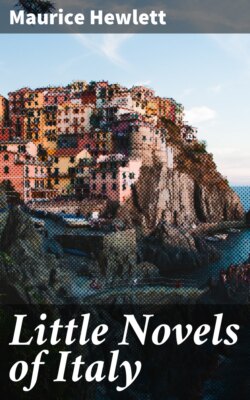Читать книгу Little Novels of Italy - Maurice Hewlett - Страница 24
На сайте Литреса книга снята с продажи.
THE GLORIOUS IPPOLITA
ОглавлениеTable of Contents
Almighty God, that supreme Architect, Who, alone among craftsmen, knows when to give and when to stay the rein, has chosen the Plain of Emilia to be, as it were, the garden of Italy, a garden set apart betwixt Alp and Apennine to be adorned within a garden; has filled it with every sort of fruit and herb and flowering tree; has watered it abundantly with noble rivers; neither stinted it of deep shade nor removed it too far from the timely stroke of the sun; has caused it, finally, to be graced here and enriched there with divers great and grave cities. Man, who has it not in him to be thrifty in so prodigal a midst, has here also thought it lawful to go free. Out of that lake of rustling leaves rise, like the masts of ships crowding a port, church towers, the belfries of pious convents, the domes and turrets of great buildings walled into cities. Among which, prized as they all are and honourably additioned—Vicenza, Treviso, Mantua, Verona, Ferrara—there is none more considerable than Padua, root of learning and grey cupolas, chosen to be the last resting-place of Antenor, King Priam's brother, and the first of Titus Livy.
It is of Padua that I am now called upon to report certain matters which may seem strange to one who does not know her well: to the others, verbum satis. Whether it is their University (too famous, perhaps, for so quiet a place) or the suspiration of their greatest citizen which has kindled their wits; whether that cauldron of brick, the Santo, bubbling with silver domes, is the stem or flower of their exaltation; whether their seat at the head of a sun-steeped marsh (at whose mouth is Venice) hath itself unseated them; whether Petrarch set boiling what Saint Antony could not allay; what it was, how it was, who gave them the wrench, I know not—but the fact is that the people of Padua have been as freakish a race as any in Italy; at the mercy of any head but the aggregate's, pack-mules of a notion, galley-slaves of a whim, driven hither and thither in a herd, like those restless leaves (souls once) whose nearer sight first made Dante pitiful. Not that they, for their part, asked for pity or got it. Mostly they paid their tavern bills when the last cup had been drained and the last chorus led. When Ezzelin was master of the revels they paid in blood: that tower of his by the river is dark with it yet. Petrarch from his mountain-vineyard at Arquà tipped them a brighter stave: they broke their hearts for pretty women and had every one the comfort of a swanlike end, since sonnets are a knack. With Antony they flagellated, with Carrara defended walls, with Gattemelata knocked them down. Then Venice took what Padua could never keep; the Euganeans hailed on either side the Lion of Saint Mark; the Arts flourished; Squarcione cut out small-clothes and taught anatomy none the worse; Mantegna dreamed of Julius Cæsar, smouldering while he dreamed; and Ippolita, the stone-mason's daughter, from too much courting fled in breeches to the hills. She, like all the Padovani, paid her score without flinching. It may have been run up without leave asked, but it was run up in her name. The rule in Padua was so; I never heard that she repined. Maybe that she had her money's worth; but of that you will be able to judge as well as I.
Padua is a city set in meadows full of light; it is well spaced, plentifully watered, arcaded, green with gardens. The streets are like cloister-walks; as in Lucca, the plane is the sacred tree, and next to that flag of green on a silver staff, the poplar shows the city blushful in the spring and thrilling all a summer with the memory. It is a place of brick and marble, painted orange, brown, yellow, and warm white, where every cornerstone and every twig is printed sharply on a sky of morning blue.
